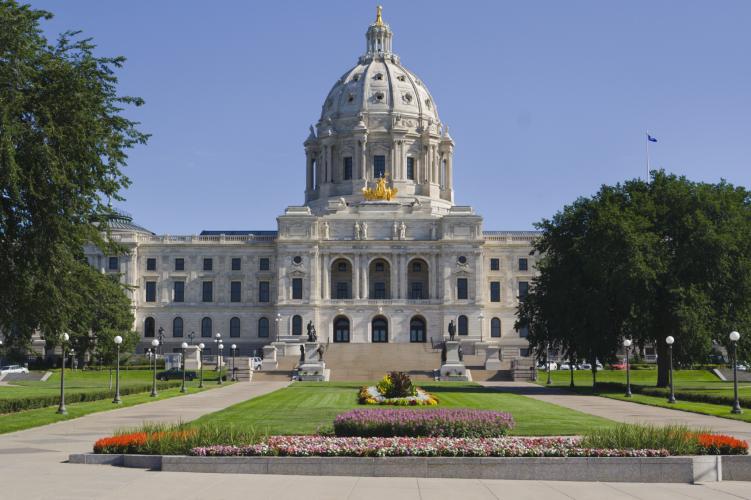
The Minnesota legislature has concluded its 2023 session, but not before passing an expansive energy package, HF2310. Minnesota has a history of bundling individual bills into omnibus bill packages to pass legislation. Ultimately, the House climate and energy package was folded into the House environment and natural resources package, with that combined omnibus bill passing the House on April 17. As the House bill differed from the Senate version, a conference committee was formed on April 25 to hammer out compromise language. This final bill passed both chambers on May 19 with Governor Walz signing it into law on May 24.
Amongst the numerous provisions, the bill includes:
-
Benchmarking - requires benchmarking for buildings served by investor-owned utilities (IOUs) in counties surrounding the Twin Cities and cities outside the metro area with a population of 50,000 or greater. Class 1 buildings (100,000 square feet or more) will begin benchmarking by June 1, 2025, and Class 2 buildings (50,000-99,999 square feet) will begin by June 1, 2026. The bill sets aside funds to implement energy benchmarking, some of which are specifically earmarked for non-IOUs to invest in technology needed to eventually implement benchmarking.
-
Weatherization and pre-weatherization - allocates $38.7 million to serve additional households and provide pre-weatherization measures to applicants who had previously been disqualified from receiving weatherization upgrades. Additionally, the bill tasks the Department of Commerce with establishing a grant program to prepare workers for careers in the weatherization industry.
-
Residential electric panel upgrade program - funds electric panel upgrades for eligible applicants, namely single-family and multifamily building owners whose occupants are below 150% area median income (AMI). The $6.5 million program will cover up to 100% of the costs to upgrade a building’s electrical panel, which can be costly but is often necessary to conduct building electrification upgrades.
-
Greenhouse gas reduction goal - modifies the state’s goal to reduce greenhouse gas (GHG) emissions. Minnesota previously had a goal to reduce GHG emissions by 80% by 2050. Now, the state will seek to reach net-zero GHG emissions by 2050 and meet interim benchmarks in the coming years.
-
Residential heat pump rebate program - allocates funds to Minnesotans who receive rebates from the Inflation Reduction Act (IRA). The $13 million program will offer rebates of $4,000 or the remaining costs after the customer accesses an IRA heat-pump rebate, whichever is lower.
-
Low-income customer definition - modifies the definition of a low-income household for eligibility in utility conservation programs from 60% AMI to 80% AMI or eligibility for other federal, state or utility programs. This will increase the percentage of the population who will qualify for low-income energy efficiency programs.
In addition to HF2310, other omnibus bills approved by the legislature included additional energy-related measures:
-
Commercial building energy codes - sets the state on a path to progressively adopt more efficient commercial building energy codes, starting with the most recent version of ASHRAE 90.1 in 2024. The commercial energy code in effect in 2036 must be 80% more efficient, using 2004 ASHRAE 90.1 as a baseline. (SF3035)
-
Climate Innovation Finance Authority - creates the framework for a finance authority to leverage public and private financing to accelerate the deployment of clean energy projects. A collective $45 million was allocated to the finance authority. (SF3035, additional funding in HF2310)
-
State competitiveness fund - provides additional funds for the state competitiveness fund, which was created earlier this session with the passage of HF1656. The fund will seek to support the state and other entities in applying for federal funds from the Infrastructure Investment and Jobs Act and the Inflation Reduction Act. The fund was initially given $115 million, but the omnibus bill added an additional $75 million. (SF3035)
-
Cannabis regulation - legalizes cannabis production and consumption in Minnesota. While other Midwestern states have included stringent environmental and energy requirements in their legalization bills, Minnesota included little language on this. The law tasks the Office of Cannabis Management to work with the Department of Commerce to create appropriate energy standards for cannabis businesses. (HF100)
The passage of HF2310 marks another accomplishment for the Minnesota legislature this session.
Earlier this year, the legislature approved HF7, with Governor Walz signing it into law on February 7. The law modifies the state’s renewable energy standard that was established by the 2007 Next Generation Energy Act. HF7 institutes a carbon-free standard that mandates the state’s electric utilities generate or procure carbon-free resources at 80% of their portfolio by 2030, 90% by 2035 and 100% by 2040. Other provisions in the law include guidance for the Public Utilities Commission (PUC) to maximize local benefits, a requirement for the PUC to consider the costs of greenhouse gas emissions in decisions and some tweaks to the PUC’s permitting process. While other states in the region have climate goals, Minnesota joins Illinois as the only two Midwestern states with laws mandating carbon-free electricity generation by mid-century.
We look forward to working with Minnesota to implement the initiatives in these laws and convert them to energy savings for Minnesotans. While Minnesota has successfully wrapped up its 2023 session, other Midwestern states have year-round legislatures and MEEA will be tracking updates to share with our members and partners. For additional updates, subscribe to MEEA’s Policy Insider or reach out to Policy Manager Maddie Wazowicz.